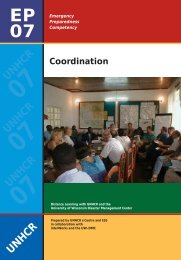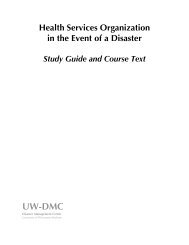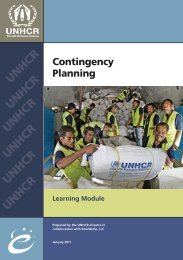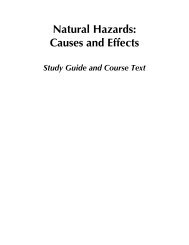Managing External Relations - Disaster Management Center ...
Managing External Relations - Disaster Management Center ...
Managing External Relations - Disaster Management Center ...
You also want an ePaper? Increase the reach of your titles
YUMPU automatically turns print PDFs into web optimized ePapers that Google loves.
Annex 2<br />
The UN does not have an army. For each peacekeeping mission, Member States voluntarily<br />
provide troops and equipment, for which they are compensated from a special peacekeeping<br />
budget. Police officers, election observers, human rights monitors and other civilians<br />
sometimes work alongside military personnel in peacekeeping operations. Lightly armed<br />
for self-defence—and often unarmed—peacekeepers’ strongest ‘weapon’ is their impartiality.<br />
They rely on persuasion and minimal use of force to defuse tensions and prevent<br />
fighting. It is dangerous business; over 1,580 UN military and civilian peacekeepers have<br />
died in the performance of their duties since 1948.<br />
The UN Security Coordinator (UNSECOORD) is responsible for all matters relating to UN security<br />
which includes monitoring the presence of UN staff and convoys in insecure areas. Decisions taken<br />
by UNSECOORD for evacuation of UN agencies and staff are mandatory.<br />
The Office of the UN High Commissioner for Human Rights (OHCHR)<br />
The following can be found on the World Wide Web at: http://www.unhchr.ch/html/hchr.htm<br />
The mission of the United Nations High Commissioner for Human Rights is to ensure the<br />
universal enjoyment of all human rights by giving practical effect to the will and resolve of the<br />
world community as expressed by the United Nations.<br />
Mandate<br />
The mandate of the Office of the United Nations High Commissioner for Human Rights<br />
derives from Articles 1, 13 and 55 of the Charter of the United Nations, the Vienna<br />
Declaration and Programme of Action and Assembly resolution 48/141 of 20 December<br />
1993, by which the Assembly established the post of United Nations High Commissioner<br />
for Human Rights. In connection with the programme for reform of the United Nations (A/<br />
51/950, para. 79), the Office of the United Nations High Commissioner for Human Rights<br />
and the Centre for Human Rights were consolidated into a single office of the United<br />
Nations High Commissioner for Human Rights as of 15 September 1997.<br />
Functions and Organisation<br />
The Office of the United Nations High Commissioner for Human Rights:<br />
(a) Promotes universal enjoyment of all human rights by giving practical effect to<br />
the will and resolve of the world community as expressed by the United Nations;<br />
(b) Plays the leading role on human rights issues and emphasises the importance of<br />
human rights at the international and national levels<br />
(c) Promotes international co-operation for human rights;<br />
(d) Simulates and co-ordinates action for human rights throughout the<br />
United Nations system;<br />
(e) Promotes universal ratification and implementation of international standards;<br />
(f) Assists in the development of new norms;<br />
(g) Supports human rights organs and treaty monitoring bodies;<br />
(h) Responds to serious violations of human rights;<br />
(i) Undertakes preventive human rights action;<br />
(j) Promotes the establishment of national human rights infrastructures;<br />
(k) Undertakes human rights field activities and operations;<br />
(l) Provides education, information advisory services and technical assistance<br />
in the field of human rights.<br />
EP<br />
04<br />
99








